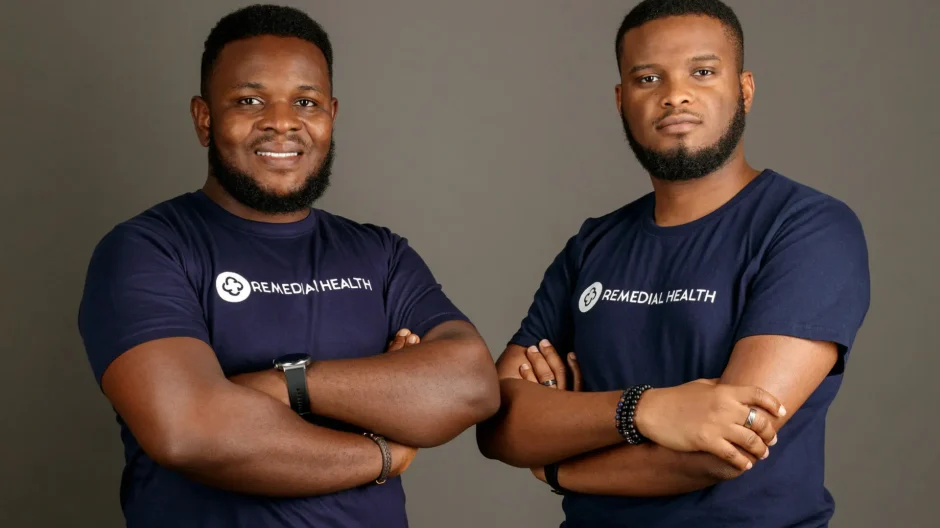Welcome to our exclusive interview with Samuel Okwuada, the co-founder of Remedial Health. We dive into the transformative journey of Remedial Health, a pioneering tech-driven healthcare supply chain solution in Africa.
FA: Samuel, thank you for joining us.
Samuel Okwuada: Thank you for having me. I’m excited to share our story.
FA: To start off, can you give us a brief overview of Remedial Health, its inception, and your journey so far?
Samuel Okwuada: Certainly. I’m Samuel Okwuada, co-founder of Remedial Health. We’re on a mission to digitize the pharmaceutical supply chain across Africa, starting with Nigeria. We provide supply chain solutions to pharmacies and hospitals, addressing the challenges of accessibility, quality, and counterfeits in the healthcare system. With a background in both pharmacy and software development, I’ve successfully built and exited several companies in the past. However, Remedial Health stands as my biggest endeavor to date, and notably, the only one that has secured venture capital funding.
FA: Fascinating. As a pharmacist and a tech enthusiast, your journey is truly unique. Did you practice as a pharmacist before founding Remedial Health?
Samuel Okwuada: Yes, asides from internships, I did practice as a pharmacist for a year after graduating before returning to Nigeria. My experience in both fields has been instrumental in shaping the vision behind Remedial Health.
FA: What inspired you to start Remedial Health, and what critical issues does it aim to address in Africa’s healthcare landscape?
Samuel Okwuada: The inspiration for Remedial Health emerged from my experience running a company called Kensington Global, which laid the foundation for what we’re doing now. Although Kensington existed before Remedial, it now operates under our umbrella as a subsidiary. At its core, Kensington was engaged in product registration under NAFTA, importing them into the country, and subsequently selling them to distributors in the market. It was a trade-centric venture that lacked a technological facet.
During this period, I recognized critical issues in the pharmaceutical supply chain. Our approach involved selling medications in open-air markets, unlike the streamlined processes in more developed countries. For instance, as a pharmacist in the UK, I could electronically place orders with suppliers, seamlessly manage inventory, and even initiate reorders if stocks were running low. Deliveries were prompt, occurring twice daily, and this efficiency enabled me to attend to patients with precision. Sadly, in Nigeria, the opposite is true.
In Nigeria, our operations are centered around open-air markets where small-scale medicine distributors operate. These open-air spaces lack hygiene standards resulting in compromised quality due to inadequate temperature and humidity control. Oversight is also lacking, allowing inexperienced individuals to distribute medicines.
Another challenge is the limited market options. Nigeria’s three major markets (Lagos, Kano, and Onitsha) serve a population of over 200 million, creating logistical hurdles for distant locations. Procuring medicines wholesale becomes infrequent, requiring pharmacies and hospitals to compile large lists before traveling long distances for restocking.
Another problem is in the supply chain’s intermediary layers. Transactions involve third or fourth-tier middlemen, inflating prices and complicating quality control, accessibility, and affordability. These challenges are at the core of Remedial Health’s innovative solutions.
We are working to modernize this supply chain, ensure access to genuine medications, and ultimately save lives.
FA: How has technology played a role in Remedial Health’s approach to solving these challenges?
Samuel Okwuada: Remedial Health is at its core a technology company with a focus on healthcare. The reason I say that is everything we do is pretty much backed by technology. Customer orders are placed through our platform on iOS or Android. We leverage technology to streamline logistics, optimize routes for deliveries, and provide real-time business intelligence.
In addition to revolutionizing the supply chain for pharmacies and hospitals, we’re introducing extra layers of support. Services like inventory management and financing are seamlessly integrated into our technological framework. This platform helps with determining distribution, allocations, and quantities. Right now, we are working on developing payment solutions for pharmacies, equipping pharmacies and hospitals with software to streamline their operations. In essence, we are a technology company tackling issues in healthcare.
FA: Your recent funding is undoubtedly a milestone. Are there any expansion plans?
Samuel Okwuada: Our immediate focus is on solidifying our presence and impact in Nigeria. We’re striving to provide our services to as many people as needed within the country. Expanding to other countries is a possibility, but our priority is to ensure a robust market share and a significant positive influence in Nigeria’s healthcare landscape.
FA: Any upcoming plans?
Samuel Okwuada: Certainly, we have exciting developments in store. Firstly, our Inventory Management solution is undergoing a relaunch, transitioning from its previous desktop version to mobile.
Additionally, we’re actively expanding our inventory financing offerings. Previously, we catered to around 25% of our client base, but our aim is to broaden this coverage significantly, targeting an expansion of 70%-80%. This expansion is driven by our current presence in 34 out of 36 states in Nigeria, with intentions to further penetrate the market.
FA: It’s clear that you’re making a substantial impact. Can you tell us about a particularly rewarding moment in your journey with Remedial Health?
Samuel Okwuada: The most rewarding aspect has been the realization that our efforts are directly contributing to saving lives. In Nigeria, the alarming rate of counterfeits reaches 40%. Imagine buying 10 medicine packs from a pharmacy, and chances are high they could all be counterfeits. Even more alarming, reported deaths due to counterfeit medicines exceed 500,000 in Nigeria alone. Yet, this number likely understates the true impact.
Last year, our operations distributed over 100 million medicine packs. Applying the 40% counterfeit rate means our Remedial Health supply chain replaced around 40 million counterfeit packs. This translates to potential lives saved and improved health outcomes for countless individuals.
FA: Can you shed some light on the significant challenges you faced in the early stages of building Remedial Health and how you’ve navigated through them?
Samuel Okwuada: Logistics has been a persistent challenge in Nigeria’s business environment. Moving goods efficiently and overcoming obstacles on the road has been a recurring hurdle. I wouldn’t necessarily say those challenges have stopped or that we are no longer facing them, however, we are learning to navigate these challenges.
FA: Lastly, the growth versus profitability debate – where do you stand?
Samuel Okwuada: The answer is now crystal clear. Once divisive, but not anymore. if you ask any African founder today, they’ll emphasize profitability. As the market slows, investments stall, and everyone tightens their budgets, profitability becomes the decisive factor. It’s about efficiently investing and reaping rewards.
As much as Remedial is growing, a foundation of sound unit economics remains. For me, profitability is paramount; without it, there’s no sustainable business. I lean toward traditional business values, prioritizing steady financial progress over rapid expansion.
FA: Thank you, Samuel, for sharing your insights and experiences with us. It’s been a pleasure delving into the remarkable journey of Remedial Health and the transformation it’s bringing to Africa’s healthcare supply chain.
Samuel Okwuada: Thank you. It’s been a pleasure to discuss our mission and vision with you. We’re committed to creating lasting change and making a positive impact on healthcare in Africa.





